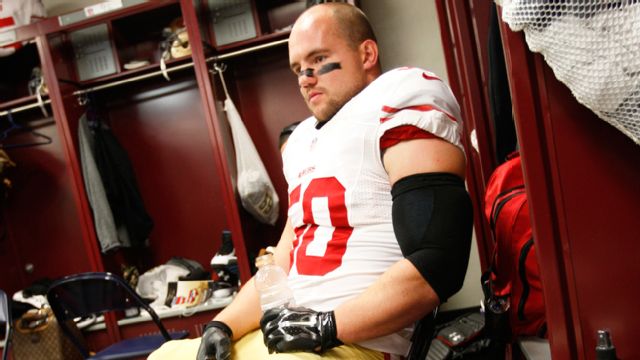Playoffs
Hall of Fame
Rookie LB Chris Borland retires due to concerns about the long-term effects of repetitive head trauma
Beginning of a trend...?
San Francisco 49ers linebacker Chris Borland, one of the NFL's top rookies last season, told "Outside the Lines" on Monday that he is retiring because of concerns about the long-term effects of repetitive head trauma.
Borland, 24, said he notified the 49ers on Friday. He said he made his decision after consulting with family members, concussion researchers, friends and current and former teammates, and studying what is known about the relationship between football and neurodegenerative disease.
"I just honestly want to do what's best for my health," Borland told "Outside the Lines." "From what I've researched and what I've experienced, I don't think it's worth the risk."
...
"I feel largely the same, as sharp as I've ever been, for me it's wanting to be proactive," said Borland. "I'm concerned that if you wait till you have symptoms, it's too late. ... There are a lot of unknowns. I can't claim that X will happen. I just want to live a long healthy life, and I don't want to have any neurological diseases or die younger than I would otherwise."
...
Borland said there was no chance he would change his mind. The third-round draft pick who starred at the University of Wisconsin said he has had just two diagnosed concussions: one while playing soccer in the eighth grade, the other playing football as a sophomore in high school.
...
His success last season did not make his decision more difficult, Borland said: "I've thought about what I could accomplish in football, but for me personally, when you read about Mike Webster and Dave Duerson and Ray Easterling, you read all these stories and to be the type of player I want to be in football, I think I'd have to take on some risks that as a person I don't want to take on." Borland was referring to former NFL greats who were diagnosed with a devastating brain disease, Chronic Traumatic Encephalopathy, or CTE, after their deaths. Duerson and Easterling committed suicide.
Borland said he began to have misgivings during training camp. He said he sustained what he believed to be a concussion stuffing a running play but played through it, in part because he was trying to make the team. "I just thought to myself, 'What am I doing? Is this how I'm going to live my adult life, banging my head, especially with what I've learned and knew about the dangers?'"
He said the issue "gathered steam" as the season progressed. Before the fourth game of the pre-season, at Houston, he wrote a letter to his parents, informing them that he thought that his career in the NFL would be brief because of his concerns about the potential long-term effects of the head injuries.
After the season, Borland said, he consulted with prominent concussion researchers and former players to affirm his decision. He also scheduled baseline tests to monitor his neurological well being going forward "and contribute to the greater research." After thinking through the potential repercussions, Borland said the decision was ultimately "simple."
...
Beginning of a trend...?


